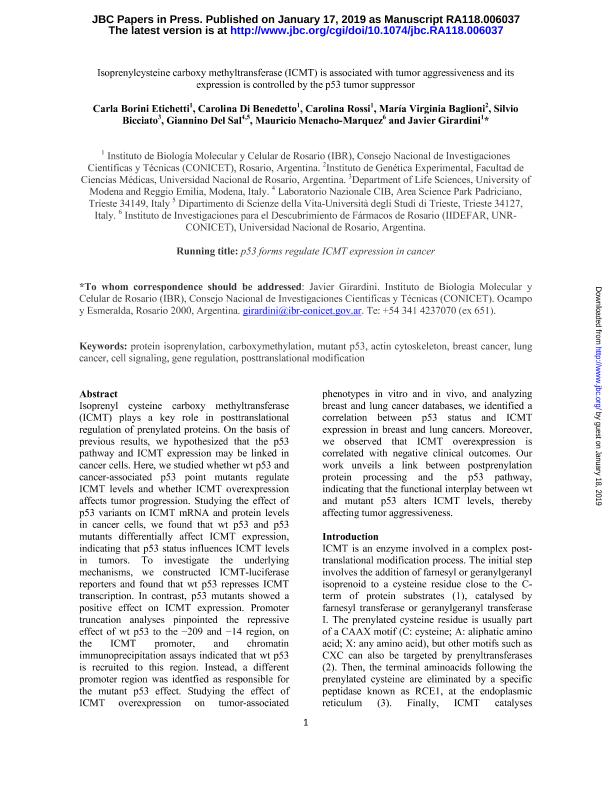Artículo
Isoprenylcysteine carboxy methyltransferase (ICMT) is associated with tumor aggressiveness and its expression is controlled by the p53 tumor suppressor
Borini Etichetti, Carla Maria ; Di Benedetto, Carolina
; Di Benedetto, Carolina ; Rossi, Carolina; Baglioni, María Virginia
; Rossi, Carolina; Baglioni, María Virginia ; Bicciato, Silvio; Del Sal, Giannino; Menacho Márquez, Mauricio Ariel
; Bicciato, Silvio; Del Sal, Giannino; Menacho Márquez, Mauricio Ariel ; Girardini Brovelli, Javier Enrique
; Girardini Brovelli, Javier Enrique
 ; Di Benedetto, Carolina
; Di Benedetto, Carolina ; Rossi, Carolina; Baglioni, María Virginia
; Rossi, Carolina; Baglioni, María Virginia ; Bicciato, Silvio; Del Sal, Giannino; Menacho Márquez, Mauricio Ariel
; Bicciato, Silvio; Del Sal, Giannino; Menacho Márquez, Mauricio Ariel ; Girardini Brovelli, Javier Enrique
; Girardini Brovelli, Javier Enrique
Fecha de publicación:
03/2019
Editorial:
American Society for Biochemistry and Molecular Biology
Revista:
Journal of Biological Chemistry
ISSN:
0021-9258
e-ISSN:
1083-351X
Idioma:
Inglés
Tipo de recurso:
Artículo publicado
Clasificación temática:
Resumen
Isoprenyl cysteine carboxyl methyltransferase (ICMT) plays a key role in post-translational regulation of prenylated proteins. On the basis of previous results, we hypothesized that the p53 pathway and ICMT expression may be linked in cancer cells. Here, we studied whether WT p53 and cancer-associated p53 point mutants regulate ICMT levels and whether ICMT overexpression affects tumor progression. Studying the effect of p53 variants on ICMT mRNA and protein levels in cancer cells, we found that WT p53 and p53 mutants differentially affect ICMT expression, indicating that p53 status influences ICMT levels in tumors. To investigate the underlying mechanisms, we constructed ICMT?luciferase reporters and found that WT p53 represses ICMT transcription. In contrast, p53 mutants showed a positive effect on ICMT expression. Promoter truncation analyses pinpointed the repressive effect of WT p53 to the 209 and 14 region on the ICMT promoter, and ChIP assays indicated that WT p53 is recruited to this region. Instead, a different promoter region was identified as responsible for the mutant p53 effect. Studying the effect of ICMT overexpression on tumor-associated phenotypes in vitro and in vivo, and analyzing breast and lung cancer databases, we identified a correlation between p53 status and ICMT expression in breast and lung cancers. Moreover, we observed that ICMT overexpression is correlated with negative clinical outcomes. Our work unveils a link between postprenylation protein processing and the p53 pathway, indicating that the functional interplay between WT and mutant p53 alters ICMT levels, thereby affecting tumor aggressiveness.
Palabras clave:
PROTEIN PRENILATION
,
CARBOXYMETHYLATION
,
ICMT
,
MUTANT P53
,
CANCER
Archivos asociados
Licencia
Identificadores
Colecciones
Articulos (IIDEFAR)
Articulos de INSTITUTO DE INVESTIGACIONES PARA EL DESCUBRIMIENTO DE FARMACOS DE ROSARIO
Articulos de INSTITUTO DE INVESTIGACIONES PARA EL DESCUBRIMIENTO DE FARMACOS DE ROSARIO
Articulos(CCT - ROSARIO)
Articulos de CTRO.CIENTIFICO TECNOL.CONICET - ROSARIO
Articulos de CTRO.CIENTIFICO TECNOL.CONICET - ROSARIO
Articulos(IBR)
Articulos de INST.DE BIOLOGIA MOLECULAR Y CELULAR DE ROSARIO
Articulos de INST.DE BIOLOGIA MOLECULAR Y CELULAR DE ROSARIO
Articulos(IDICER)
Articulos de INSTITUTO DE INMUNOLOGIA CLINICA Y EXPERIMENTAL DE ROSARIO
Articulos de INSTITUTO DE INMUNOLOGIA CLINICA Y EXPERIMENTAL DE ROSARIO
Citación
Borini Etichetti, Carla Maria; Di Benedetto, Carolina; Rossi, Carolina; Baglioni, María Virginia; Bicciato, Silvio; et al.; Isoprenylcysteine carboxy methyltransferase (ICMT) is associated with tumor aggressiveness and its expression is controlled by the p53 tumor suppressor; American Society for Biochemistry and Molecular Biology; Journal of Biological Chemistry; 294; 13; 3-2019; 5060-5073
Compartir
Altmétricas



